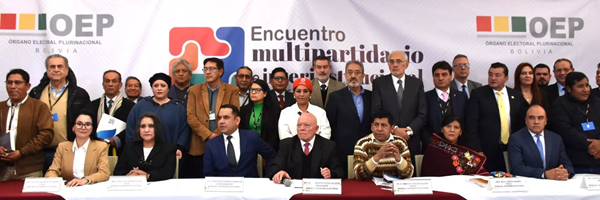Agreement Reached in Bolivia to Unblock Electoral Process (Evo Morales Left Out)

Orinoco, July 14, 2024 —
The government of Luis Arce seems to have found a solution to the political crisis affecting the legislative and judicial bodies of Bolivia. In the Multiparty Meeting organized by the Supreme Electoral Tribunal (TSE), the part of the ruling Movement Towards Socialism (MAS) party that responds to Arce signed an agreement with 12 other political organizations. The part of MAS that follows former President Evo Morales was left out, after he left the meeting without signing the final document.
This agreement must be approved by the Plurinational Legislative Assembly, where the legislators loyal to Arce, together with the opposition parties Comunidad Ciudadana (CC) and Creemos, have the necessary votes to make this agreement viable. However, the most controversial point of the document is the suspension of the primary elections, since there is not have enough time to carry them out.
The agreement also established that the judicial elections, which were to take place in 2023, will be held this year.
Morales, for his part, asked for the recognition of his presidency of MAS in order to endorse the agreement.
Sputnik consulted analysts and politicians from both sectors, who provided their views on the complex scenario.
“The primary elections have the objective of strengthening democracy within political parties, and until two elections ago parties elected candidates according to who got the most [votes],” analyst Rodrigo Eid, who sympathizes with the MAS sector of Evo Morales, told Sputnik.
“In the traditional parties elections are carried out like this: the one who puts in the most money is the one who nominates candidates. On the other hand, MAS is administered in a more democratic way. Each social organization that is part of it proposes its candidates,” he explained.
Besides MAS, there are 10 other parties in Bolivia, in addition to the alliances CC and Creemos. Most of them have suffered setbacks in electing their new leadership.
“The heads of the other political parties do not want to go to primaries because they would have to face other leaderships within their parties,” Eid said. “The government [of Luis Arce] does not want primaries because it is easier for them to eliminate Evo Morales by judicial means so that he is not a candidate,” he added, as he considers that if primaries were held within the MAS, Morales would win.
Other mechanisms to elect party leadership
“I agree with abolishing the primaries because each political party and citizen grouping have internal mechanisms for pre-selecting candidates,” MAS Deputy Olivia Guachalla, aligned with the Arce line, told Sputnik.
She said that primary elections had already been held once, prior to the 2019 general elections, which were annulled after the coup against Morales. “The primaries are to define candidacies. When we did it in the MAS, it was to ratify a person,” she said, adding that carrying out a primary entails a useless expense.
The legislator claimed that the majority of the Plurinational Legislative Assembly will approve the proposal that emerged from the Multiparty Meeting. “We understand that primaries are not a democratic scenario,” she commented. “If we hold closed primaries [in which only registered party members vote] we are going to ratify people. We do not want to spend money in logistics and materials when the country needs other things.”
Elections of the judiciary
Currently the central problem for the Bolivian judiciary is the lack of elections of magistrates of the Supreme Court of Justice, the Plurinational Constitutional Court, the Agro-environmental Court, and the Magistrates Council. The elections were to be held in 2023, but several disagreements within the Plurinational Legislative Assembly prevented it.
Recently the legislators were in the process of pre-selecting candidates, but it was halted by a court ruling.
“This situation is regrettable,” Guachalla said. “The judicial system itself continues to paralyze this process. We ask the judicial authorities to make an assessment. The Plurinational Legislative Assembly, by mandate, is the only instance that approves the list of pre-candidates for the TSE to carry out the judicial elections.”
“Then we must do our work. We ask the judiciary to uphold the separation of powers and let the Assembly do its work,” said the legislator.
In order for the judicial elections to be held in 2024, “the process of examination of candidacies must be completed in order to generate a preliminary list that the corresponding parliamentary commission will refer to the Assembly and be approved by two thirds. Then it will be referred to the TSE, which will carry out the rest of the process,” the deputy explained.
According to analyst Eid, the obstacles imposed by the judiciary in this regard are aimed at preventing this election process from taking place this year.
